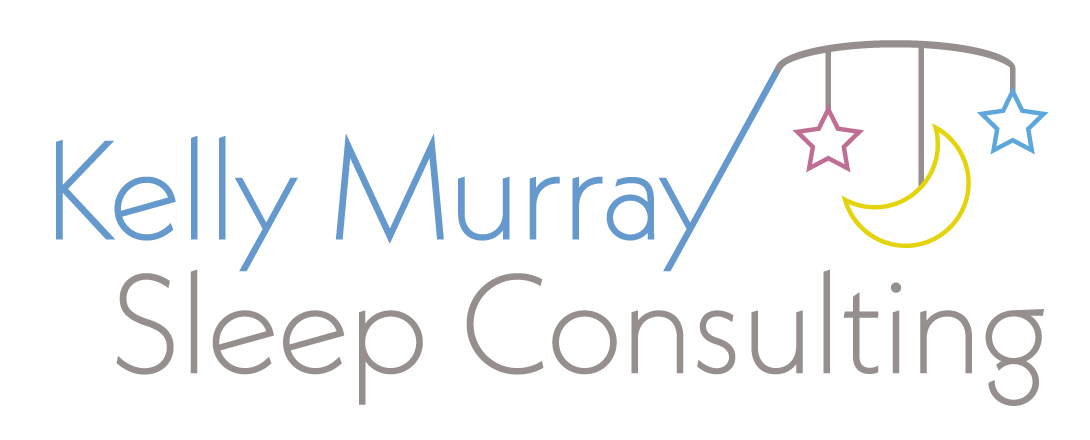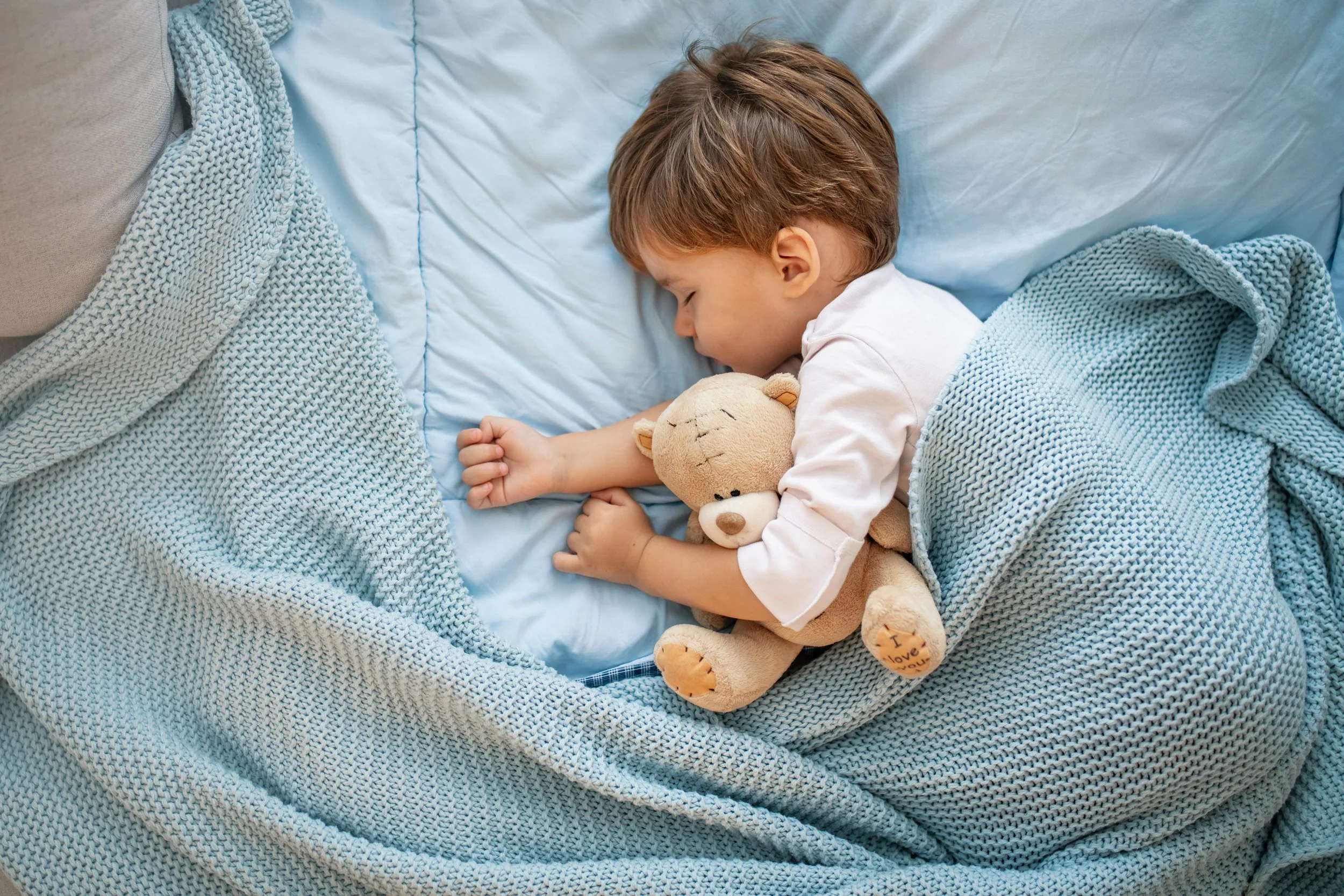Is There a Sleep Regression at Two Years Old?
By Katie Giguere, Sleep Consultant
The short answer is: YES!
I want to share about the two year sleep regression because I am currently living it with my daughter. She is 22 months old but this regression can happen anywhere around that two year age mark. I am currently watching my daughter roll around on the monitor; it's been taking her a little bit longer to fall asleep at nap time during this regression.
What Are Regressions and When Do They Happen?
Let’s talk a little bit about regressions in general first. A regression is whenever you see your child's sleep patterns change for the worse. Sleep regressions can happen at all sorts of ages. The most common one that people have heard about is the four-month regression.
When babies turn four months, their sleep cycles mature from infant sleep cycles to more adult sleep cycles like ours. It's a lot of change; they're waking up more often in the middle of the night and it's really hard for them, especially if they don't have those independent sleep skills. If your child is going through the four-month sleep regression, check out this article. It will help!
What Causes the Two Year Sleep Regression
The two-year sleep regression can happen for a few different reasons:
Developmental Leap
The most common cause for the two-year sleep regression is a developmental leap. A developmental leap is when your baby or toddler is learning something new, and it can be distracting in other parts of their lives, such as when they sleep.
For many toddlers at this age, their language skills are exploding. They are learning that what they say can affect what happens. They're also super excited because they're starting to put a few words together to say sentences. My daughter has started putting 2-3 words together in short mini sentences, and it's super exciting for her.
During this language burst, toddlers want to use their new skills all the time. When you put them in their crib, they're not quite ready to go to sleep yet sometimes because they want to practice their new skills.
A lot of the times I'll see my daughter on the monitor; she'll just be lying in bed, rolling around, making noises, and saying words out loud. This is exciting for them but can disrupt their sleep pattern if it takes them longer to fall asleep. They might not be getting as much sleep as they should, which can make them overtired, and with a toddler, that's not ideal because they're so emotional at this stage.
Learning How to Regulate Emotions
They are still trying to learn how to control their emotions. It's tough for them to regulate, so they're practicing this right now too. It can be really hard for them to settle down for sleep when they're having all these emotions running and having a hard time getting them out in a healthy way.
Very, very distracting for sleep!
Testing Boundaries
Another thing that happens when toddlers are two or three years old is they start testing their parent’s boundaries. We see this a lot with our toddler clients.
This can look like your toddler getting out of bed after you have laid them down and told them that they need to stay in their bed - they're testing you.
They're pushing you to see what they can get away with.
We work with a lot of families that have this issue. It's just about making the boundaries firm, making sure that they know the rules that they need to follow, keeping it very black and white, so it's not confusing to them, so they know exactly what's expected of them, and then keeping the boundaries firm.
Firming up boundaries will lessen the amount of time that you're dealing with this issue.
Separation Anxiety and Fears
Separation anxiety and new fears are also other things that can cause the two-year sleep regression. Their imagination is also forming at this age. Babies are not afraid of the dark. This is something that develops when they're a little older.
Toddlers could start to have fears, these thoughts that something bad will happen to them. It’s essential for us, as parents, to honor the feelings that they're experiencing. They're allowed to be afraid. They're scared. They're human, just like we are. But we don't want to solidify their fears by removing them from the situation. Instead, we want to help them cope.
For example: they're afraid to be by themselves. If you let them sleep in your bed then you may be accidentally affirming to your child that it is scary to be alone. Instead, you want to talk to your child about the situation and about how they're feeling. Acknowledge that they're scared and then coming up with different strategies to help your child cope with these emotions. So depending on your child, some things may work better than others. We have a list of strategies you can use for anxiety.
There are so many things that you can do to help teach your child how to regulate their emotions and their fears at night. If you practice these these things with them, it'll help a lot.
Being able to put themselves back to sleep if they wake in the night is a great skill to have. Even during the day if they're upset or scared of something, it's really good for them to have strategies in place that they can use so they can take a deep breath and move on from the situation.
Two Year Molars
Another thing that can disrupt sleep a little bit is the two-year molars that come in. But this typically doesn't last longer than a couple of days. It's really just the days that the molars are erupting through the gums that can be very, very uncomfortable for your child.
As long as you're comfortable administering some pain meds to your child per your doctor's recommendations, that can definitely help them feel a little bit more comfortable. But teeth pain should not affect sleep for more than a couple of days.
If you're seeing disrupted sleep for longer than that, it's probably something else. So just keep that in mind. Just because they're getting teeth doesn't mean they can't sleep. They might be a little bit uncomfortable, but it's not going to affect them for weeks on end.
Crib Climbing
This is a huge one!
Once they start figuring out how to climb out of their crib. We need to get them out of the crib if there isn't another option.
A lot of people have cribs where you can lower the mattress all the way to the floor. So the crib mattress is still enclosed in the crib but they can't climb higher. If there's enough height, they're not going to be able to get over. Some people don't have this option with the kind of crib they have so a pack-and-play could be an alternative. A pack-and-play is more challenging for them to use their feet to scale up the side because it's mesh. But if that's not an option, we need to get them out of the crib as soon as possible because we don't want them to hurt themselves.
If this happens at a younger age, under two and a half, we must ensure their room is thoroughly baby-proofed. If they're able to get out of their room, you want to make sure that they are not able to hurt themselves in the middle of the night. That's huge.
This is a very big transition for them. In a crib, they're enclosed, and it helps them feel safe. Once they're in that toddler bed, it's more open, and it can be tough for them to transition into that.
We suggest keeping them in the crib as long as you can. And then once they are ready, either they're climbing out, or they have voiced an opinion saying that they're ready for their big kid bed, and they're three years old or older, feel free to make that transition.
But before you do, make sure that they have good bedtime rules so that they're staying in bed at night so they don't get out of that they hurt themselves or come out and get you.
Sleep Needs are Changing
If none of the above things are happening to your child and they're still having sleep issues it's probably a sign that their sleep needs are changing.
When they were really, really little, they needed a lot of sleep. Now that they're a toddler, they're sleep needs decrease. 12 to 13 hours of sleep in a 24-hour period is pretty typical for toddlers. So that means nighttime and nap time.
For example: a couple months ago my daughter was waking up at 7:00 AM and going to bed at 7:00 PM with a 2-2.5 hour nap in the middle of the day. Well it’s no longer working out that way! She's taking 11 hours at night now, and I've bumped her down to an hour and a half nap because her sleep needs changed.
If they're getting too much nap time in the middle of the day, it can make them wake up early in the morning.
It can be hard to pinpoint, even for sleep consultants, and can be a lot of trial and error.
My daughter is going through this two-year sleep regression and I thought I had figured out what was going on but this has been happening for a couple months now. So I have been playing around with changing her schedule a little bit, just making sure that she’s not getting too much sleep or too little sleep for her age.
If toddlers are getting too little sleep, they could be overtired, which can cause them to wake up more.
Signs of the Two-Year Sleep Regression
This regression can look like taking a long time to fall asleep at night, or waking up multiple times in the night, or waking up super early in the morning, or it might only affect naps.
And sometimes it can be a combination.
For my daughter it has mostly been affecting the nap. But since she’s a good sleeper this hasn't been terrible for us because she has been sleep trained since about five months old. She knows how to put herself to sleep, which is great.
Every child, regardless of their independent sleep abilities will go through these regressions. If your child knows how to put themselves to sleep already before they go through one of these regressions, it's going to be easier for everybody in the family. If your child does not have independent sleep skills, these regressions can be super, super exhausting for them and for you.
We suggest teaching your child independent sleep skills. We work with families with children of all ages. If your child needs some independent sleep skills we can help you establish those.
We'd love to help make this two year sleep regression easier for you!
All team members have completed training with Kelly and have learned the Murray Method. Kelly continues to support, guide and oversee the Sleep Squad as they work with the families who trust in us. This way, all clients are able to experience the same amazing results (and lots and lots of sleep).
Sweet Dreams…
Kelly Murray is a certified sleep coach and an award-winning pediatric sleep consultant based in Chicago offering sleep coaching services nationwide.














